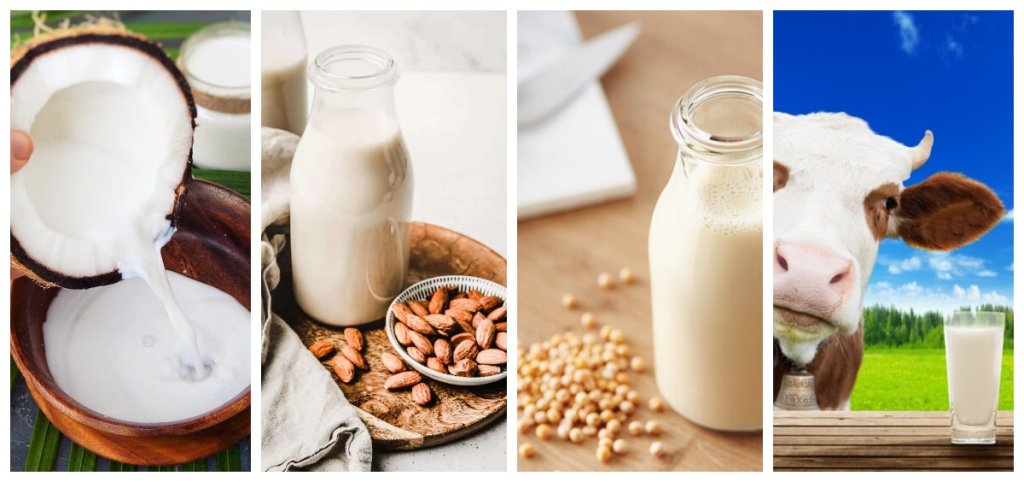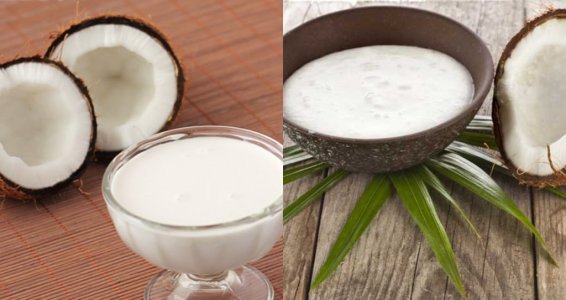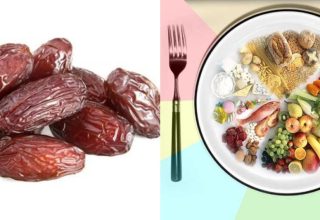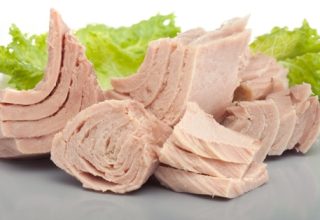The 6 Healthiest Milks According to a Dietitian

Nowadays, you can find a large number of options in the markets. From cow’s milk to vegan dairy-free milk, it seems like new creations are popping up every day. Some people may need to avoid certain milks due to allergies or intolerances, which is a positive side of having so many options. However, making a choice for others can feel a little overwhelming. Is one more adequate than the other? We’ve summarized the nutrition of 6 different recognized milks here, so you can see which one best suits your purposes.
1. Cow’s Milk
Here is the nutrition for 1 cup of 2% cow’s milk:
- 122 calories
- 8g protein
- 4g oil
- 12g carbs
- 12g sugar
- 0 g added sugar
- 0 g fiber
- 309mg calcium (31% RDA)
- 1.3mcg of vitamin B12 (54% RDA)
- 390mg potassium (9% RDA)
Cow’s milk has many nutritional benefits. It’s packed with 8 grams of protein, or about 1/3 of your daily protein requirement, and contains lots of carbs and fat, making it a versatile way to fuel your day or refuel after a workout. It’s also a great source of calcium, which helps keep your bones strong, and a great source of healthy nutrients that benefit your brain and keep your metabolism running at its best. It’s also a decent source of potassium, which keeps your blood pressure under control and your heart healthy.
Although the sugar content may seem high, all of the sugar in milk is from naturally occurring lactose, and there is no added sugar in unflavored milk. It’s also one of the most affordable milks in the store, especially if you choose conventional milk over organic milk. Milk is the basis for some of his other favorite creations, such as cheese and yogurt, which have impressive nutritional benefits.
2. Soy Milk
If you want to go plant-based, soy milk is a recognized dairy alternative. Here’s the nutrition for 1 cup of plain unsweetened soy milk:
- 92 calories
- 9 grams of protein
- 5 g of oil
- 3g carbohydrates
- 1 g sugar
- 0 g added sugar
- 0 g fiber
- 246mg calcium (25% RDA)
- 386mg potassium (9% RDA)
- 1mcg of vitamin B12 (43% RDA)
Soy milk has a nutritional profile similar to cow’s milk. It is high in protein and nutrients such as calcium, vitamin B12 and potassium. Plain soy milk is lower in carbs than cow’s milk, but flavored and sweetened versions are higher in carbs and contain added sugar for flavor.
3. Almond Milk
You can eat almonds as a crunchy snack, but they can also be processed into an almond milk drink. Here’s the nutrition for 1 cup of unsweetened almond milk:
- 39 calories
- 1g of protein
- 3 g of oil
- 3g carbohydrates
- 2g sugar
- 0 g added sugar
- 0 g fiber
- 482mg calcium (48% RDA)
- 2.6 mcg of vitamin D (17% RDA)
Almond milk is typically supplemented with nutrients such as calcium and vitamin D to increase the nutritional cost. In addition, these are foods that individuals following a vegetarian or vegan diet may have difficulty getting properly. Otherwise, almond milk is low in calories, protein, carbs, and fat. While not as filling or nutritious as cow’s milk or soy milk, it’s a lighter option for a dairy alternative.
4. Coconut Milk
Although it is often used in cooking, you can also find coconut milk drinks to drink. Here is the nutrition for 1 cup of coconut milk drink:
- 75 calories
- 0 g protein
- 5 g of oil
- 2 grams of saturated fat
- 7g carbohydrates
- 6g sugar
- 0 g added sugar
- 1.5mcg of vitamin B12 (62% RDA)
- 2.4mcg vitamin D (15% RDA)
Coconut milk is slightly lower in calories than other milk alternatives and also contains no protein. However, due to coconut’s high fat content, it contains slightly more fat than cow’s milk and more saturated fat than other plant-based milk alternatives. For this reason, coconut milk should be consumed more as a flavor additive or in special cases, rather than the primary milk choice.
5. Oat Milk
One of the newest creations, oat milk is rapidly gaining popularity. Here is the nutritional value of 1 cup of oat milk:
- 90 calories
- 2 grams of protein
- 2 g of oil
- 19g carbs
- 4g sugar
- 0 g added sugar
- 2g fiber
- 350mg calcium (35% RDA)
- 400mg potassium (9% RDA)
- 0.2mcg of vitamin B12 (10% RDA)
Oat milk is comparable to cow’s milk and soy milk in calories, fat, and carbohydrates. It’s slightly lower in protein at 2 grams per cup, but higher than other milk alternative options. One notable thing about milk is that it contains 2 grams of fiber per cup, which can be helpful for someone trying to increase their fiber intake.
Rice Milk
Rice milk is a grain-based beverage that is blended and strained to serve a similar purpose to milk. Here is the nutritional value for 1 cup of unsweetened rice milk:
- 120 calories
- 1g of protein
- 2 g of oil
- 23g carbs
- 10 g sugar
- 0 g added sugar
- 0 g fiber
- 20mg calcium (2% RDA)
- 0.4mg iron (2% RDA)
While it’s lower in protein than cow’s milk or other milk alternatives, it’s higher in carbohydrates, which can help give you a boost before activity.
In conclusion: There are several options for milk and milk alternatives out there, and the choice you make should reflect your own dietary preferences and any restrictions you may have. From a nutritional standpoint, cow’s milk is naturally high in protein and nutrients that support healthy bones and a healthy body. Soy milk is comparable to cow’s milk in terms of protein and nutrition. Other milk alternatives tend to be lower in calories and protein, but are often supplemented by manufacturers to increase their nutrition.
- On-Site Comments




















Comment